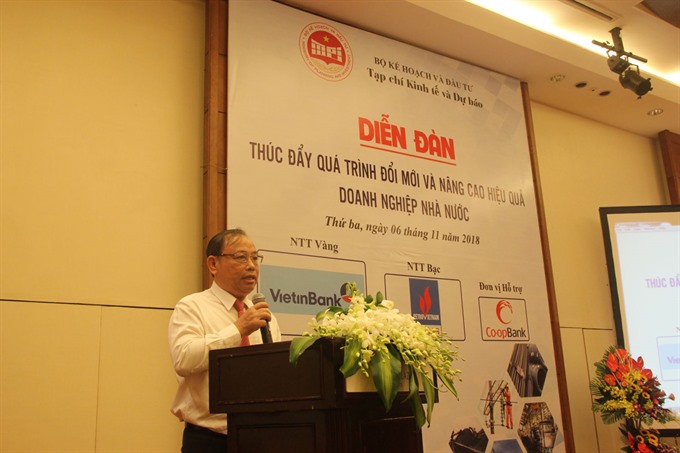Equitisation and divestment were key tasks for restructuring State-owned enterprises (SOEs), said Deputy Minister of Planning and Investment Nguyen Van Hieu.

Equitisation and divestment were key tasks for restructuring State-owned enterprises (SOEs), said Deputy Minister of Planning and Investment Nguyen Van Hieu.
Speaking at a forum on promoting the renewal process and raising the efficiency of SOEs held in Ha Noi on Tuesday, Hieu said that enterprises needed to increase their equitisation efforts and comply with legal provisions, meeting international requirements and practices.
“They need to build feasible plans, ensuring the accuracy and transparency of information and clarifying debt issues in order to attract potential investors,” said Hieu.
Hieu said that through over 20 years of reform, the number of SOEs had fallen from 12,000 in the early 1990s to about 500.
“Many SOEs have been holding large amounts of State assets but their production, business efficiency and contributions to the State budget are low. A number of projects have suffered big losses. Equitisation and divestment from SOEs had not reached the Government’s targets,” said Hieu.
The main reason is that a number of business leaders were unwilling to change, avoiding responsibility or worrying about loss of interests if the business model changes. Problems related to land, asset valuation, institutional inefficiencies, regulations, obstacles in handling labour arrangements and propaganda had not been solved effectively, said Hieu.
In addition, several leaders’ corporate management capacity was weak, especially investment in modern technology, not meeting the demands of change as well as challenges in the Fourth Industrial Revolution and international economic integration, he added.
According to Director of the Finance Ministry’s Enterprise Finance Department Dang Quyet Tien, the process of reforming, reorganising and improving the efficiency of SOEs had been conducted for many years and achieved remarkable results.
Since 2016, 74 out of 137 enterprises had been equitised, earning trillions of dong for the State budget and contributing to the diversification of ownership. After equitisation, many businesses had continued to develop, ensuring quality, reputation and brand.
However, Tien said there were still some shortcomings such as slow equitisation and poor business performance in other enterprises. Economic efficiency was limited and tending to decrease.
“SOEs contribute 22 per cent to the total State budget and 28 per cent to GDP. The performance and profitability of SOEs are lower in comparison with other sectors,” said Tien.
According to Pham Duc Trung, an official from the Central Institute for Economic Management, to operate effectively, SOEs should continue to renovate their management mechanisms to apply international corporate governance practices and increase the efficiency of management of State assets.
Trung said the Government would continue to accelerate the speed of equitisation and diversify business ownership, while focusing on improving the scale, range and competitiveness of some branded and capable economic groups in the hope of pushing businesses into the world’s top 500 as well as being able to compete in the region. — VNS





